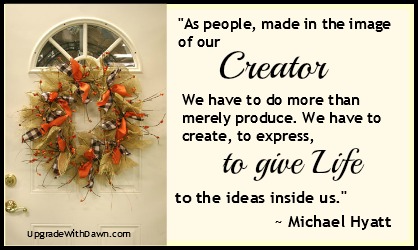Upgrade Your Homemaking with the 7Ps
Morgan Farr is a multi-talentd woman with great influence both biblically and practically. In this Homemaking UPGRADE, she applies a military concept to home skills for greater success.
![]() “Prior Proper Planning Prevents Painfully Poor Performance,” Morgan says. “This is a saying that is often posted in military circles, often referred to as the 7Ps.”
“Prior Proper Planning Prevents Painfully Poor Performance,” Morgan says. “This is a saying that is often posted in military circles, often referred to as the 7Ps.”
I (Dawn) think that’s a mouthful and hard to say, but it certainly drives home an important point!
Morgan continues . . .
I have used my own version of the 7Ps to successfully run a military garage gym ministry, and I want to share my 7Ps of Homemaking.
I have found that almost all of my stress in homemaking has been related to not having enough time or energy for a task. With my 7Ps for homemaking I am better able to manage my time and energy.
These are the Ps that I follow:
- Planning and Preparation
- Pace and Play
- Pen, Pew and Prayer
1. Plan and Prepare
The first thing that I would recommend to anyone looking to upgrade their homemaking would be planning and preparation. These are crucial aspects of running a home well.
From planning the meals, doctors appointments, and vacations, to planning guest visits… homemakers plan a lot.
“Let everything be done decently and in order” (1 Corinthians 14:40).
Find a way that works for you and use it to help you plan and prepare well.
While I am aware that there are a million calendar apps out there, I am still a paper planner kind of gal. I have a large wall calendar and a small spiral bound planner that stand between me and disordered chaos.
I use a different color coded pen for each member of the family. That way I know at a glance who has something major each day. This helps me to plan out my week and see any major issues ahead of time.
My husband and I make certain that we are available on Sunday evenings for a planning meeting for the week. We discuss upcoming events, things that need to be added to the grocery list, and anything else that needs to be prepared in order to keep the family running smoothly.
2. Pace and Play
Once you have a plan and you have prepared to follow through on it, the next thing you should do is decide on your pace and play rhythm.
"By the seventh day God had finished the work he had been doing; so on the seventh day he rested from all his work. Then God blessed the seventh day and made it holy, because on it he rested from all the work of creating that he had done" (Genesis 2:2-3).
The Creator of the entire universe rested on the seventh day.
Be realistic about how much work you can bear at this point and create opportunities to recharge.
There are many ways to get ahead in this area and upgrade your homemaking. I have alarms set on my phone for 1:30 pm every single day. This helps me to pause whatever project that I am working on, and take a break.
This break could mean:
- I read a book,
- I walk on the treadmill,
- I sit and drink a cup of coffee, etc.
It depends on the day and the projects I am working on. If you are someone who loves the outdoors, maybe that means stepping outside to enjoy God’s creation for 15 minutes on your lunch break.
The important part here is to realize that while hard work is good, it is equally important to set a healthy pace with opportunities to play the way that works best for you.
3. Pen, Pew, and Prayer
My final—and probably most important—recommendation is to make sure you spend time with a pen, in a pew and in prayer.
“And we urge you, brothers and sisters, warn those who are idle and disruptive, encourage the disheartened, help the weak, be patient with everyone" (1 Thessalonians 5:14).
I think everyone should keep a journal, no matter the season of life. This can help you avoid sin patterns, love the people around you, and understand yourself better. Even if all you can do is write in a one word entry, that can help you later to see where your heart and mind is headed over time.
I would also strongly encourage you to get in the pew at church.
By that I mean:
- Be a part of the fellowship and accountability.
- Find a mentor and a mentee in your community.
- Be a part of the body of Christ in both a physical way and in your prayers.
Sharing our burdens with other believers is one of the greatest mercies of the Christian faith. We have to be vulnerable enough to open up our hearts and share the burdens that we carry, especially as homemakers where much of the battle is unseen among mops, children, and groceries.
God has given us the incredible ability to be keepers of our homes. It is our responsibility to ensure that we do the absolute best job of it that we can.
Taking the time to ensure that we follow the 7Ps helps us to honor God with our homemaking.
Which of these 7Ps do you need to devote more energy to?
Morgan Farr is a Texas-loving, succulent-cultivating, book nerd. Stationed in Philadelphia, Pennsylvania, this Army wife is working to better love her husband, develop her three small children, and learn more about homeschool. Morgan is a homemaker dedicating her time to ministering to other Army wives through Bible studies, one-on-one mentoring, and physical training. She writes about her transition out of feminism and into biblical womanhood at The Forgiven Former Feminist.
this Army wife is working to better love her husband, develop her three small children, and learn more about homeschool. Morgan is a homemaker dedicating her time to ministering to other Army wives through Bible studies, one-on-one mentoring, and physical training. She writes about her transition out of feminism and into biblical womanhood at The Forgiven Former Feminist.
Graphic adapted, courtesy of RawPixel at Pixabay.
 2 Comments → Posted on
2 Comments → Posted on  Tuesday, September 24, 2019 at 4:55AM
Tuesday, September 24, 2019 at 4:55AM  Homemaker,
Homemaker,  Homemaking,
Homemaking,  Journaling,
Journaling,  Morgan Farr,
Morgan Farr,  Organization,
Organization,  Pacing our work,
Pacing our work,  Planning,
Planning,  Prayer,
Prayer,  Preparation,
Preparation,  Upgrade with Dawn Upgrade Your Life
Upgrade with Dawn Upgrade Your Life  Homemaking
Homemaking 













